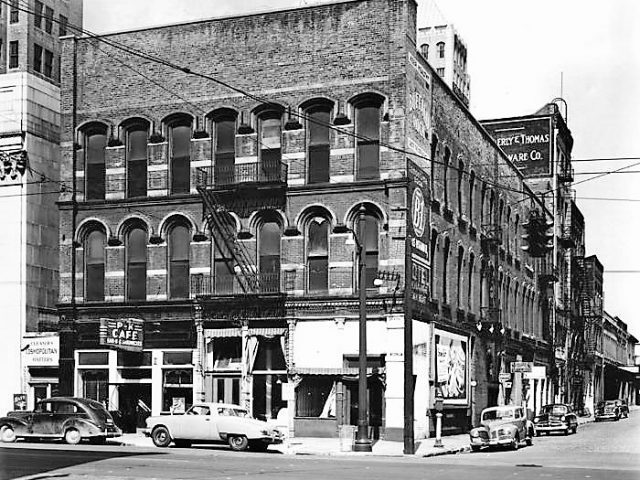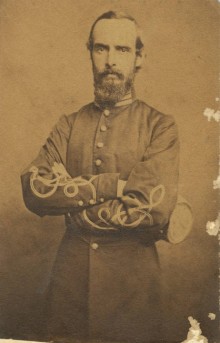Biographies of the Delegates to the Alabama Secession Convention
Part XII 1
John M. McClannahan
Shelby County
Nothing is known about the early life and family of John M. McClannahan. He was a lawyer, businessman, a large property owner and probate judge of Shelby County, Alabama. After the war he went to Louisiana, where he was killed by lightning in 1867. (findagrave.com memorial 66865277)
NOTE ADDITIONAL INFORMATION
From: Reminiscences of Public Men in Alabama: For Thirty Years, with an Appendix By William Garrett Plantation Publishing Company’s Press, 1872
John M. McClanahan served through the sessions (Legislative) of 1837 and 1838, a young man of modest deportment, amounting almost to timidity. After this, he engaged earnestly in professional pursuits as a lawyer, and in private enterprises. For many years he was Judge of the County and Probate Court of Shelby, in which office he gave entire satisfaction to the people. He was successful in the acquisition of property, and the war found him well to do.
He went into the Convention of 1861 with Judge Shortridge, as a delegate from Shelby, and cooperated with the majority. After the surrender, he removed to Louisiana, where, in 1867, he was killed by lightning. He was a gentleman of intelligence and a valuable citizen.
The Ouachita Telegraph
July 18, 1867
Page 2, Column 3
AN EDITOR KILLED BY LIGHTNING. The Mansfield Times (De Soto Parish) comes to us draped in mourning for the death of one of its editors, Judge Jno. M. McClanahan, from a stroke by lightning, causing instantaneous death.
Deceased was standing at the time in the front piazza of his residence watching the approach of a cloud. Judge McClanahan was for many years a resident of Shelby County, Alabama, but removed to Louisiana some eighteen months ago.
He had filled many responsible positions in that State. He had already made hosts of friends in his new home, and died greatly lamented.
Thomas Joyce McClellan
Limestone County
Descended from Scotch-Irish ancestry and an officer of the Continental Army during the American Revolution, Thomas Joyce McClellan was born July 2, 1811, in Lincoln County, Tennessee, and died at Athens, Alabama, on October 14, 1887. The son of William and Matilda Joyce McClellan, he moved to Limestone County, Alabama in 1844 Before leaving Tennessee he married Martha Flemming Beattie and five of their seven children were born there, Settling on a farm eleven miles east of Athens, McClellan became a successful farmer and a prominent citizen of his adopted county. He represented Limestone County in the legislature from 1861 to 1865, and the Constitutional Convention of 1865. McClellan was the father of seven children: John Beattie, William Cowan, Robert Anderson, Thomas Nicholas, Sarah Ann, Matilda Joyce and Katherine. (findagrave.com memorial 61539581)
NOTE ADDITIONAL INFORMATION
From The Southern Historical Collection at the Louis Round Wilson Special Collections Library, UNC, Collection Number: 01850 —Collection Title: Buchanan and McClellan Family Papers, 1816-1922.
Prominent members of the Buchanan family of Warren and Lincoln counties, Tenn., and McClellan family of Limestone County, Ala., included Andrew Buchanan (fl. 1820-1865), planter and merchant; his son, Felix Grundy Buchanan (d. circa 1910), Confederate soldier; Thomas Joyce McClellan (fl. 1836-1880), planter, Whig politician, and member of the Alabama Secession Convention of 1861; Thomas’s son, William C. McClellan (d. 1869), Confederate soldier; William’s son, Thomas Nicholas McClellan (1853-1906), Alabama state senator, 1880-1884, attorney general, 1884-1889, associate justice of the Alabama supreme court, 1889-1898, and Alabama chief justice, 1898-1906; and William’s daughters, Matilda McClellan (fl. 1859-1914) and Kate McClellan Buchanan (fl. 1859-1917). The collection is chiefly correspondence dealing with land transactions in Warren and Lincoln counties, Tenn., and in Limestone County, Ala.; family news; and farm activities. Thomas J. McClellan’s interest in Whig politics in Alabama is documented, as is Thomas Nicholas McClellan’s political career. Several Buchanan and McClellan family members fought during the Civil War, including William C. McClellan, who wrote home about the first battle of Bull Run and the battle of Fredericksburg, 1862. Matilda McClellan is the chief correspondent in the years after the Civil War. Her letters primarily concern family matters. There are also financial and legal materials relating to McClellan family members, particularly land transactions and cases handled by McClellan & McClellan of Athens, Ga., 1880s-1920s.
James McKinney
Dale County
No information available for sketch in transcription – Spelling is that of the enrollment of delegates in the Manuscript Journal of the Convention. The name is also spelled “McKinnie” and “McKinney.”
NOTE ADDITIONAL INFORMATION
Excerpt from Southern Star
The History Corner (Southern Star Wednesday, November 6, 1985 -18) The Freedmen’s Bureau in Dale County By Creel Richardson
The whites were fearful of the future and uncertain of their tenure on the property which remained in their possession.” Many of them had lost everything “and had to begin over again in the midst of a
completely disorganized society.” James McKinnie, largest slave owner in Dale County in 1860 with 90 slaves and 14 slave houses, suffered the greatest loss in the county.
John McPherson
Butler County
John McPherson was born March 6. 1796 at Fayetteville, North Carolina, son of William and Christian McPherson. He received a common school education and became a farmer and a county commissioner. The date of McPherson’s move to Alabama has not been determined, but it is known that he was a Presbyterian elder. Although he is buried at the Sandy Ridge Church near Fort Deposit, Alabama, it is not known when his death occurred.
NOTE ADDITIONAL INFORMATION
From History of Alabama and Dictionary of Alabama Biography, Volume 4
By Thomas McAdory Owen, Marie Bankhead Owen, S. J. Clarke Publishing Company 1921
McPHERSON, JOHN, farmer, member secession convention, 1861, was born March 6, 1796, at Fayetteville, N. C, and died and was buried at Sandy Ridge church, near Ft. Deposit; son of William and Christian (McDonald) McPherson, a native of Scotland, who came to America and located in North Carolina. He received a common school education in the country schools; became a farmer, and served as county commissioner. He was a member of the constitutional convention held in Montgomery in 1861, was a Democrat, and strong advocate of secession. He was an elder in the Presbyterian church. Married: in 1825, in Marion District, S. C, to Mary Bethune. He had no children. Last residence: Greenville.
Julius Caesar Bonaparte Mitchell
Montgomery County
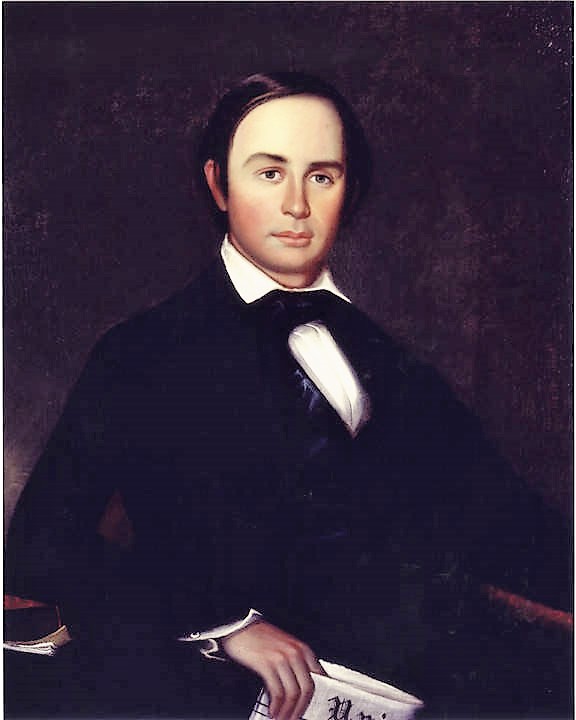
Born in 1819 and died October 4, 1869, Julius Caesar Bonaparte Mitchell lived at Waugh and Mt. Meigs, Montgomery County, Alabama. Mitchell was a lawyer and operator of a plantation and warehouse. During the war, he was a lieutenant colonel of the Thirteenth Alabama Infantry. He was first married to Jane Murdoch and then to Rebecca Murdoch. (findagrave.com 37092789)
Rebecca Ellen (Murdoch) Mitchell 2nd wife of Julius Mitchell (Alabama Department of Archives and History)

NOTE ADDITIONAL INFORMATION
From Alabama Department of Archives and History note with photograph
Although Mitchell was photographed with the insignia of a general, he never rose above the colonel in the 34th Alabama Infantry. Major campaigns and battles of the 34th Alabama include Murfreesboro, Chickamauga, Missionary Ridge, the Atlanta campaign, Franklin, and Nashville, Sources: Brewer, Willis. Alabama, Her History, Resources, War Record and Public Men from 1540 to 1872. Davis, William C.., ed. The Confederate General, Vol 5, National Historical Society, 1991.
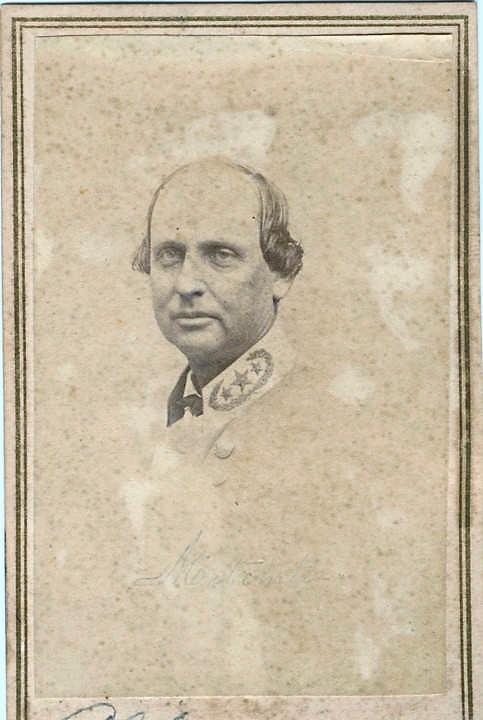
From Note Alabama Department of Archives and History note with the portrait
Julius Caesar Boneparte Mitchell was a delegate to the constitutional convention of 1862 (also known as the Secession Convention). During the Civil War, he served as a lieutenant colonel of the 2nd Alabama Infantry and a colonel of the 34th Alabama Infantry, C. S. A. This portrait was painted by Joseph Thoits Moore ca. 1845.
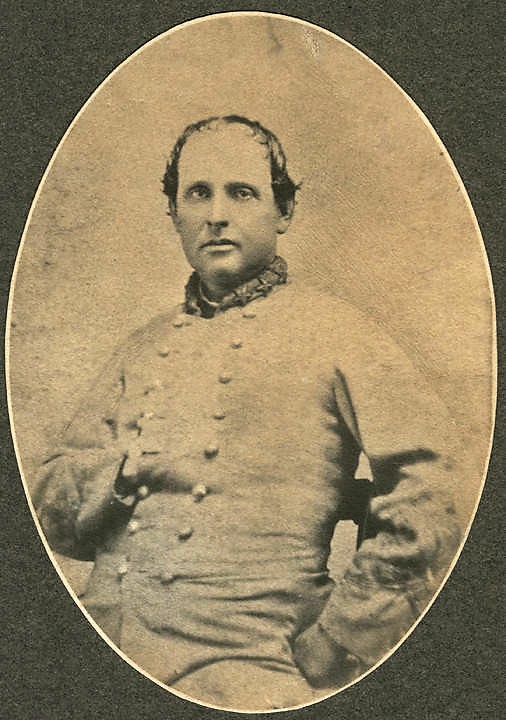
John Tyler Morgan
Dallas County
A lawyer, United States senator and brigadier general of the Confederate Army, John Tyler Morgan was born June 20, 1824, at Athens, Tennessee, and died in Washington, D. C., on June 11, 1907. He was the son of George and Frances (Irby) Morgan, the former named for George Washington who was visiting the family the night he was born. Morgan’s parents migrated from Saratoga, New York, to Tennessee and then to Calhoun County, Alabama, and settled on government land. At the age of six, he entered the pioneer school taught by Charles P. Samuel but was forced to withdraw three years later when his parents moved from Tennessee to Alabama. He helped his father to cultivate the land in this wilderness among the Indians, and experience useful to him later when he became Chairman of the Committee on Indian Affairs of the United States Senate.
John Tyler Morgan ca. 1849 (Alabama Department of Archives and History)
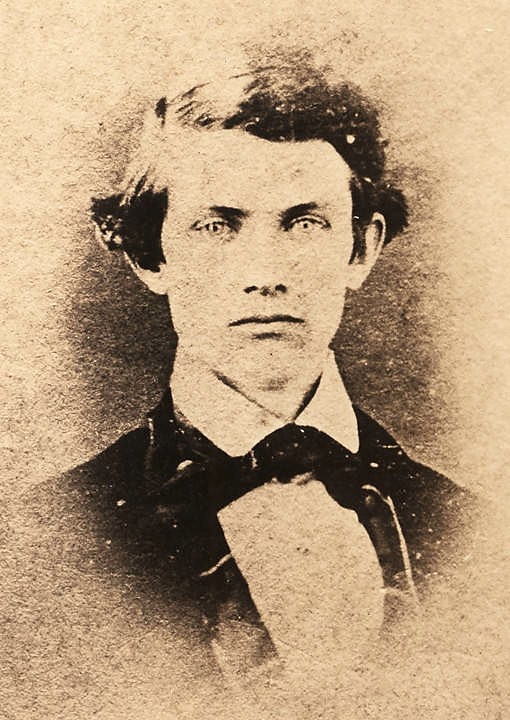
In the absence of schools, Morgan continued his studies under his mother’s guidance. Reading law in the office of William P. Chilton of Tuskegee, he was admitted to the bar at that place in 1845. After practicing his profession at Tuskegee for ten years he moved to Dallas County, where he maintained residence for the remainder of his life. Morgan’s first appearance in the political world came in 1860 when he was made a presidential elector on the Breckenridge ticket. Preferring military to political service during the war, Morgan served as a private, major, lieutenant colonel and brigadier general of the infantry and cavalry.
Brigadier General John Tyler Morgan (Alabama Department of Archvies and History)

As soon as the war ended be resumed his law practice and became a leader in the restoration of white supremacy and sound principles of local self-government during the reconstruction period.
John Tyler Morgan 1876 (Alabama Department of Archives and History)
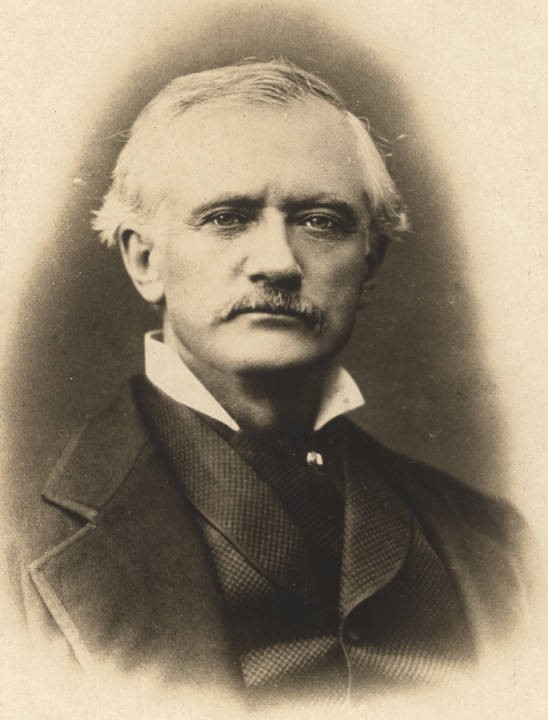
In 1876 the Republicans tried twice to bar him from the United States Senate but he was successful in the contest. Morgan thought the best way for the Southern Democrats to reestablish themselves was to take an active part in the discussions and legislation pertaining to the whole country, and he did much while serving there to overcome prejudices of Northern senators against the South. Serving in the United States Senate from 1876 to 1907, Morgan sponsored legislation to turn over large tracts of coal and iron land to the University and Normal schools in Alabama and to improve the navigation and waterways of the state. During this period he opposed the abolition of national banks, public ownership of railroads, the famous “Force Bill” of 1900, and many other measures which he thought to be detrimental to the general welfare of his country. Early in his service Senator Morgan began a campaign for an Isthmian Canal, and he supported the move so vigorously that he was called the father of the idea.
Portrait of John Tyler Morgan ca. 1900 (Alabama Department of Archives and History)
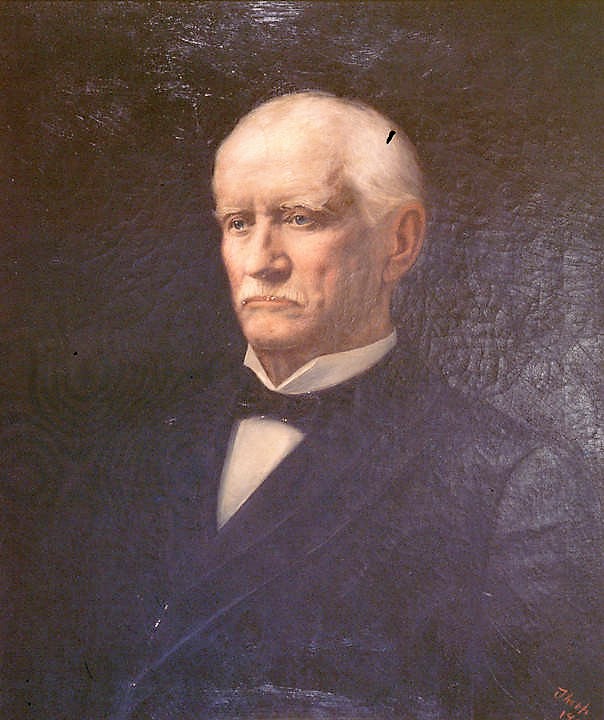
In 1892, President Harrison appointed him to the Committee on Bering Sea Fisheries to settle a dispute with Great Britain over fishing rights in the waters adjacent to Alaska. Subsequently, Morgan served four years on the Committee on Foreign Affairs and was appointed to draft the code of laws for Hawaii. He urged the annexation of Cuba and the Phillipines. He was a Methodist. Married to Cornelia Willis of Talladega County, he was the father of four children, John, Mary, Cornelia and George. (findagrave.com memorial 8760)
NOTE ADDITIONAL INFORMATION
From History of Alabama and Dictionary of Alabama Biography, Volume 4
By Thomas McAdory Owen, Marie Bankhead Owen, S. J. Clarke publishing Company 1921
His mother was a native of Virginia, daughter of an Episcopal clergyman and a woman of rare mental attainments; grandson of Gideon and Patience (Cogswell) Morgan of Connecticut, the former a merchant and Revolutionary soldier, who died a nonogenearian, as did his father.
During the latter part of the seventeenth century three brothers of the Clan Morgan sailed from Wales for American, one, from whom Senator Morgan is descended, settling in Connecticut, one in New York and the third in New Jersey.
1. Transcribed from The Alabama Historical Quarterly, Vol. 03, Nos. 03 & 04, Fall and Winter Issue 1941
WHERE DO I START? Hints and Tips for Beginning Genealogists with On-line resources
Do you need some guidance in your genealogy search? Save time and avoid pitfalls in your research. This book provides simple, no-nonsense instructions to help you get started. Many FREE research links included. Where Do I Start is filled with Hints and Tips to begin your family genealogy research and acquire Genealogy information.
- WHERE TO FIND – on-line resources, experienced genealogists will not be aware of many of these.
- COURT RESEARCH – how to do court house research, where to find birth, death, social security records free on-line.
- EIGHTY – ONE QUESTIONS – you should ask your elderly loved-ones before it’s too late.
- TIPS ON BREAKING DOWN THE WALL – Everyone faces some difficulties in research, often called a ‘brick wall’ but WHERE DO I START? provides suggestions for overcoming them.



